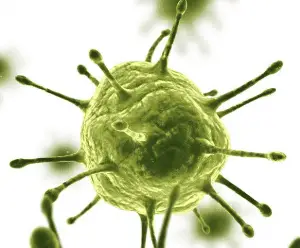31st May 2014
By Sayer Ji
Contributing Writer for Wake Up World
A new study published in medical journal The Lancet reveals that an experimental vaccine manufactured by Merck using a genetically modified adenovirus actually increased the risk of contracting HIV infection in recipients.
For the study titled, “Recombinant adenovirus type 5 HIV gag/pol/nef vaccine in South Africa: unblinded, long-term follow-up of the phase 2b HVTN 503/Phambili study“, researchers randomly assigned a total of 801 HIV-1 uninfected, sexually active adults aged 18-35 years from five sites in South Africa to receive either the vaccine (400) or a placebo (401). 216 (27%) received only one injection, 529 (66%) received only two injections, and 56 (7%) received three injections.
The results were reported as follows:
“At a median follow-up of 42 months (IQR 31—42), 63 vaccine recipients (16%) had HIV-1 infection compared with 37 placebo recipients (9%; adjusted HR 1 ·70, 95% CI 1 ·13—2 ·55; p=0 ·01). Risk for HIV-1 infection did not differ according to the number of vaccinations received, sex, circumcision, or adenovirus type 5 (Ad5) serostatus. Differences in risk behaviour at baseline or during the study, or annualised dropout rate (7 ·7% [95% CI 6 ·2—9 ·5] for vaccine recipients vs 8 ·8% [7 ·1—10 ·7] for placebo recipients; p=0 ·40) are unlikely explanations for the increased rate of HIV-1 infections seen in vaccine recipients.”
In other words, those receiving vaccines had a 70% increased risk [HR 1 ·70] of contracting HIV versus those receiving the placebo.
[pro_ad_display_adzone id=”110028″]
The researchers concluded:
“The increased risk of HIV-1 acquisition in vaccine recipients, irrespective of number of doses received, warrants further investigation to understand the biological mechanism. We caution against further use of the Ad5 vector for HIV vaccines.”
According to a report written about the study by Dr. Mark Thoma, MD:
“Since the end of the last century, there have been a number of HIV vaccines developed and tested. Over 30 clinical trials of these vaccines have been done to see if they conferred immunity to HIV to those volunteers who agreed to participate in the trials. To date, none of the trials have shown that any of the vaccines can produce significant immunity in a number of people against infection with HIV.”
Now, with the discovery of vaccine-enhanced acquisition of HIV-1, clearly there is a risk that the ‘cure’ offered by HIV vaccines may actually be worse than doing nothing at all. The researchers hypothesized that the genetically engineered adenovirus vector used to deliver HIV antigens into the vaccine receiptient may lead to an expansion of activated Ad5-specific T cells thereby increasing the number of HIV-1 target cells.
While a specific mechanism has yet to be identified to explain vaccine-enhanced risk, the study clearly shows that rather than conferring increased immunity, the vaccine reduces it. With the recent resurgence of measles, whooping cough, varicella (shingles) in highly immunized populations, research like this speaks to fundamental flaws in the vaccine-centric preventive health model. Perhaps the focus should return to supporting immunity by decreasing unnecessary harmful chemical and biological exposures, and optimizing dietary support for natural immunity – it worked for millions of years before synthetic immunity via vaccines became the dominant paradigm only a half century ago.
Also, cases of HIV clearance using natural products should provide sufficient motivation to conduct trials on natural compounds with proven efficacy in cell, animal and preclinical studies.
Further articles by Sayer Ji:
- Biophotons: The Human Body Emits, Communicates with, and is Made from Light
- Black Seed Extract ‘Cures’ HIV Patient Naturally
- 3 Evidence-Based Ways To Reverse Skin Aging Naturally
- How to Clean Your Arteries With One Simple Fruit
- 13 Evidence-Based Medicinal Properties of Coconut Oil
- Amazing Food Science Discovery: Edible Plants ‘Talk’ To Animal Cells, Promote Healing
- Splenda Found To Have Possible Neurotoxic Properties In Animal Study
- The Spice That Prevents Fluoride From Destroying Your Brain
- Turmeric Beats Ibuprofen for Arthritis of the Knee
- Live Flu Vaccines Increase Infectious Bacteria Counts 100-Fold in Mice
- FAIL: Another Mammography Study Finds They Don’t Save Lives
- The 2013 Measles Outbreak: A Failing Vaccine, Not A Failure To Vaccinate
- The Cancer-Causing Metal Millions Eat, Wear or Have Injected Into Their Kids
About the author:
 Sayer Ji is an author, educator, Steering Committee Member of the Global GMO Free Coalition (GGFC), advisory board member of the National Health Federation, and the founder of GreenMedInfo.com – an open access, evidence-based resource supporting natural and integrative modalities. His writings have been published and referenced widely in print and online, including Truthout, Mercola.com, The Journal of Gluten Sensitivity, New York Times and The Well Being Journal.
Sayer Ji is an author, educator, Steering Committee Member of the Global GMO Free Coalition (GGFC), advisory board member of the National Health Federation, and the founder of GreenMedInfo.com – an open access, evidence-based resource supporting natural and integrative modalities. His writings have been published and referenced widely in print and online, including Truthout, Mercola.com, The Journal of Gluten Sensitivity, New York Times and The Well Being Journal.
In 1995 Sayer received a BA degree in Philosophy from Rutgers University, where he studied under the American philosopher Dr. Bruce W. Wilshire, with a focus on the philosophy of science. In 1996, following residency at the Zen Mountain Monastery in upstate New York, he embarked on a 5 year journey of service as a counsellor-teacher and wilderness therapy specialist for various organizations that serve underprivileged and/or adjudicated populations. Since 2003, Sayer has served as a patient advocate and an educator and consultant for the natural health and wellness field.
Visit GreenMedInfo online and on Facebook, or sign up for GreenMedInfo’s Newsletter.
Disclaimer: This article is not intended to provide specific medical advice, diagnosis or treatment.
[pro_ad_display_adzone id=”110027″]







